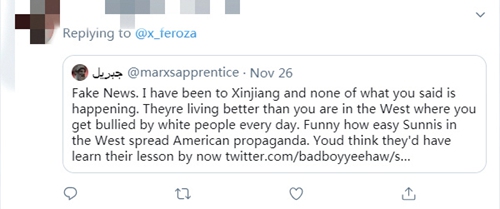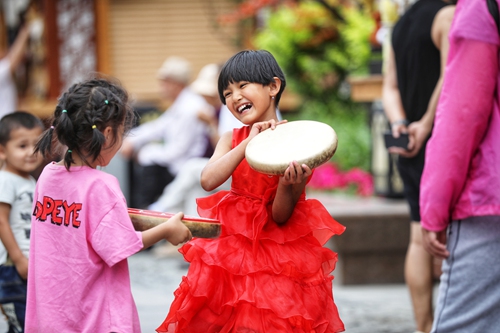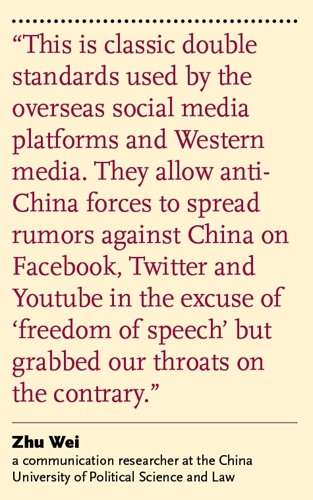HOME >> CHINA
The Feroza Aziz incident reveals double standards of Western media
By Liu Xin and Li Qiao Source:Global Times Published: 2019/11/28 20:23:41
When Western media make blindly criticizing China an attractive trend, people like Feroza Aziz will follow suit either to build a reputation as human rights defenders or to attract public attention

In the wake of Western media efforts hyping so-called leaked documents on China's Xinjiang, Aziz has given them a chance to accuse China of "censorship" on a Chinese-owned social media app and to attack China's Xinjiang policies.
However, experts said Aziz's information about Xinjiang is from biased Western media reports. Cases like Aziz show Western mainstream media lack professionalism when it comes to reporting on China, and they also give platforms to people misinformed by anti-China propaganda.
Trying to get attention
While making a TikTok video teaching people how to get long eyelashes on November 23, Aziz, a high-school junior from New Jersey, told her audience to search what is happening in China and mentioned so-called "concentration camps" and "abuse" of Muslims in Xinjiang.
She told MTV News that she used a fake makeup tutorial video for "the first few second to reel viewers in to then speak about the Uyghur."
Aziz has 5,800 followers on TikTok. Many of Aziz's TikTok videos uploaded online are her making faces, which usually got less "likes." The ones where she talks about Xinjiang have 577,700 likes.
She even started a Twitter to keep up with the spread of her TikTok video. She now has 10,500 followers on Twitter account and 14,000 followers on Instagram.


Although admitting she did not seek the spotlight, Aziz was interviewed by many media in recent days. Her remarks on accusing China for "mistreating" Muslims sparked some criticisms among netizens.
Many said that she should not spread rumors without even conducting surveys or visiting China's Xinjiang. And some said she wants to draw attention by talking about something she does not clearly understand.
There is no public information showing Aziz has been to China.
Calling herself "Just a Muslim trying to spread awareness" on her Twitter account, how could Aziz spread true awareness, considering her impression on Xinjiang came from rumors and fake news made by some US media, said some netizens.
If she wants to speak about serious topics on human rights violations or accusing China for mistreating Muslims, she should do serious independent surveys and not spread fake news or use rumors to attract audiences, a netizen commented.
According to the words on one of the TikTok videos Aziz uploaded to her Twitter account, she alleged that "innocent muslims are getting murdered everyday in the middle east and in China."
"It is the US who set bombs which killed thousands of Muslims in the Middle East and the whole world has witnessed the crime. However, together with people of all ethnic groups and religions, China is building a stable and prosperous Xinjiang. How could Aziz make such irresponsible remarks?" a netizen commented.
Being misled and spreading rumors
When Western media make blindly criticizing China an attractive trend, people like Aziz will follow suit either to build a reputation as human rights defenders or to attract public attention, analysts said, adding that Aziz has set a very bad example for young people.
"Some Western media use freedom of speech as a pretext to export their political positions and spread rumors against China," Zhu Wei, a communication researcher at the China University of Political Science and Law, told the Global Times.
Such inflammatory rhetoric may be said to be in violation of the Charter of the United Nations and International Law. Some Western teenagers are not interested in politics actually; they know China from biased media and just believe the content of their reports without any evidence, Zhu said.

Aziz told MTV News that she first learned about "concentration camps" in Xinjiang in 2018 and heard about "victims' stories," including Mihrigul Tursun.
Chinese Foreign Ministry Spokesperson Hua Chunying debunked Tursun's story as having no solid evidence in January.
CNN reported Tursun claimed her son had died in Urumqi Children's Hospital in Xinjiang in 2015, and that they had been victims of "Beijing's growing crackdown on the Muslim majority Uyghur" in Xinjiang.
Hua said that one of Tursun's three children was sent to a hospital in Urumqi due to pneumonia, hydrocephalus and other illnesses. Records show Tursun and her husband took the child out of China in April 2018 shortly before leaving China altogether with her other two children. She was never arrested in Urumqi and never went to jail, nor has she been sent to any vocational training and education centers.
Hua said CNN's report of Tursun was a total fabrication. CNN never corrected the mistake.
Mihrigul Tursun's case is not the only one that has been hyped by Western media and disproven by the Chinese government. Some so-called Uyghur activists claimed their relatives were mistreated in Xinjiang. However, Global Times reporters visited their relatives and found all of them living freely.
"Issues on China have always been hot topics for Western media and smearing or attacking China has been regarded as 'a right thing to do.' Some politicians want to attack China's issues and contain China from rising. They never give up bias when talking about China issues," Zhu said.
Foreign social media accounts, including those on Twitter, Facebook and Youtube, assist the spread of rumors and fake news on China, said Zhu .
He noted that these social media platforms shut down many Chinese accounts in late August for their support of the Hong Kong police. Chinese scholars' Facebook accounts were blocked from posting articles about Hong Kong.

"This is classic double standards used by the overseas social media platforms and Western media. They allow anti-China forces to spread rumors against China on Facebook, Twitter and Youtube in the excuse of 'freedom of speech' but grabbed our throats on the contrary."
In response to the Aziz incident, Chinese Foreign Ministry Spokesperson Geng Shuang said on Wednesday that he knew nothing about Aziz's TikTok account being suspended.
"I can only tell you that the Chinese government asks our companies to observe international rules as well as local laws and regulations when doing business overseas. We also hope other countries will provide them a fair, just and non-discriminatory business environment as we consistently stated," Geng said.

Newspaper headline: Fact vs fiction

Residents in Aksu Prefecture in Northwest China's Xinjiang Uyghur Autonomous Region celebrate the apricot harvest in June 2019. Photo: VCG
In the wake of Western media efforts hyping so-called leaked documents on China's Xinjiang, Aziz has given them a chance to accuse China of "censorship" on a Chinese-owned social media app and to attack China's Xinjiang policies.
However, experts said Aziz's information about Xinjiang is from biased Western media reports. Cases like Aziz show Western mainstream media lack professionalism when it comes to reporting on China, and they also give platforms to people misinformed by anti-China propaganda.
Trying to get attention
While making a TikTok video teaching people how to get long eyelashes on November 23, Aziz, a high-school junior from New Jersey, told her audience to search what is happening in China and mentioned so-called "concentration camps" and "abuse" of Muslims in Xinjiang.
She told MTV News that she used a fake makeup tutorial video for "the first few second to reel viewers in to then speak about the Uyghur."
Aziz has 5,800 followers on TikTok. Many of Aziz's TikTok videos uploaded online are her making faces, which usually got less "likes." The ones where she talks about Xinjiang have 577,700 likes.
She even started a Twitter to keep up with the spread of her TikTok video. She now has 10,500 followers on Twitter account and 14,000 followers on Instagram.

Inset: Screenshot of netizens' comments under Feroza Aziz's Twitter account

Inset: Screenshot of netizens' comments under Feroza Aziz's Twitter account
Although admitting she did not seek the spotlight, Aziz was interviewed by many media in recent days. Her remarks on accusing China for "mistreating" Muslims sparked some criticisms among netizens.
Many said that she should not spread rumors without even conducting surveys or visiting China's Xinjiang. And some said she wants to draw attention by talking about something she does not clearly understand.
There is no public information showing Aziz has been to China.
Calling herself "Just a Muslim trying to spread awareness" on her Twitter account, how could Aziz spread true awareness, considering her impression on Xinjiang came from rumors and fake news made by some US media, said some netizens.
If she wants to speak about serious topics on human rights violations or accusing China for mistreating Muslims, she should do serious independent surveys and not spread fake news or use rumors to attract audiences, a netizen commented.
According to the words on one of the TikTok videos Aziz uploaded to her Twitter account, she alleged that "innocent muslims are getting murdered everyday in the middle east and in China."
"It is the US who set bombs which killed thousands of Muslims in the Middle East and the whole world has witnessed the crime. However, together with people of all ethnic groups and religions, China is building a stable and prosperous Xinjiang. How could Aziz make such irresponsible remarks?" a netizen commented.
Being misled and spreading rumors
When Western media make blindly criticizing China an attractive trend, people like Aziz will follow suit either to build a reputation as human rights defenders or to attract public attention, analysts said, adding that Aziz has set a very bad example for young people.
"Some Western media use freedom of speech as a pretext to export their political positions and spread rumors against China," Zhu Wei, a communication researcher at the China University of Political Science and Law, told the Global Times.
Such inflammatory rhetoric may be said to be in violation of the Charter of the United Nations and International Law. Some Western teenagers are not interested in politics actually; they know China from biased media and just believe the content of their reports without any evidence, Zhu said.

Children in Xinjiang Uyghur Autonomous Region Photo: Cui Meng/GT
Aziz told MTV News that she first learned about "concentration camps" in Xinjiang in 2018 and heard about "victims' stories," including Mihrigul Tursun.
Chinese Foreign Ministry Spokesperson Hua Chunying debunked Tursun's story as having no solid evidence in January.
CNN reported Tursun claimed her son had died in Urumqi Children's Hospital in Xinjiang in 2015, and that they had been victims of "Beijing's growing crackdown on the Muslim majority Uyghur" in Xinjiang.
Hua said that one of Tursun's three children was sent to a hospital in Urumqi due to pneumonia, hydrocephalus and other illnesses. Records show Tursun and her husband took the child out of China in April 2018 shortly before leaving China altogether with her other two children. She was never arrested in Urumqi and never went to jail, nor has she been sent to any vocational training and education centers.
Hua said CNN's report of Tursun was a total fabrication. CNN never corrected the mistake.
Mihrigul Tursun's case is not the only one that has been hyped by Western media and disproven by the Chinese government. Some so-called Uyghur activists claimed their relatives were mistreated in Xinjiang. However, Global Times reporters visited their relatives and found all of them living freely.
"Issues on China have always been hot topics for Western media and smearing or attacking China has been regarded as 'a right thing to do.' Some politicians want to attack China's issues and contain China from rising. They never give up bias when talking about China issues," Zhu said.
Foreign social media accounts, including those on Twitter, Facebook and Youtube, assist the spread of rumors and fake news on China, said Zhu .
He noted that these social media platforms shut down many Chinese accounts in late August for their support of the Hong Kong police. Chinese scholars' Facebook accounts were blocked from posting articles about Hong Kong.

Global Times
"This is classic double standards used by the overseas social media platforms and Western media. They allow anti-China forces to spread rumors against China on Facebook, Twitter and Youtube in the excuse of 'freedom of speech' but grabbed our throats on the contrary."
In response to the Aziz incident, Chinese Foreign Ministry Spokesperson Geng Shuang said on Wednesday that he knew nothing about Aziz's TikTok account being suspended.
"I can only tell you that the Chinese government asks our companies to observe international rules as well as local laws and regulations when doing business overseas. We also hope other countries will provide them a fair, just and non-discriminatory business environment as we consistently stated," Geng said.

Global Times
Newspaper headline: Fact vs fiction